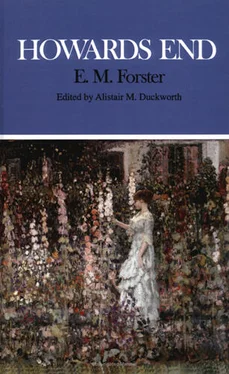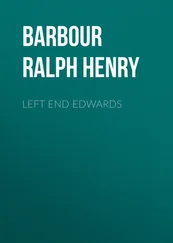Edward Morgan Forster - Howards End
Здесь есть возможность читать онлайн «Edward Morgan Forster - Howards End» весь текст электронной книги совершенно бесплатно (целиком полную версию без сокращений). В некоторых случаях можно слушать аудио, скачать через торрент в формате fb2 и присутствует краткое содержание. Жанр: Классическая проза, на английском языке. Описание произведения, (предисловие) а так же отзывы посетителей доступны на портале библиотеки ЛибКат.
- Название:Howards End
- Автор:
- Жанр:
- Год:неизвестен
- ISBN:нет данных
- Рейтинг книги:3 / 5. Голосов: 1
-
Избранное:Добавить в избранное
- Отзывы:
-
Ваша оценка:
- 60
- 1
- 2
- 3
- 4
- 5
Howards End: краткое содержание, описание и аннотация
Предлагаем к чтению аннотацию, описание, краткое содержание или предисловие (зависит от того, что написал сам автор книги «Howards End»). Если вы не нашли необходимую информацию о книге — напишите в комментариях, мы постараемся отыскать её.
Howards End — читать онлайн бесплатно полную книгу (весь текст) целиком
Ниже представлен текст книги, разбитый по страницам. Система сохранения места последней прочитанной страницы, позволяет с удобством читать онлайн бесплатно книгу «Howards End», без необходимости каждый раз заново искать на чём Вы остановились. Поставьте закладку, и сможете в любой момент перейти на страницу, на которой закончили чтение.
Интервал:
Закладка:
"I don't know where she is, pater," said Charles. "Dolly kept back dinner nearly an hour for her."
"Tell me when she comes in—."
Another hour passed. The servants went to bed, and Charles visited his father again, to receive further instructions. Mrs. Wilcox had still not returned.
"I'll sit up for her as late as you like, but she can hardly be coming. Isn't she stopping with her sister at the hotel?"
"Perhaps," said Mr. Wilcox thoughtfully—"perhaps."
"Can I do anything for you, sir?"
"Not tonight, my boy."
Mr. Wilcox liked being called sir. He raised his eyes and gave his son more open a look of tenderness than he usually ventured. He saw Charles as little boy and strong man in one. Though his wife had proved unstable his children were left to him.
After midnight he tapped on Charles's door. "I can't sleep," he said. "I had better have a talk with you and get it over."
He complained of the heat. Charles took him out into the garden, and they paced up and down in their dressing-gowns. Charles became very quiet as the story unrolled; he had known all along that Margaret was as bad as her sister.
"She will feel differently in the morning," said Mr. Wilcox, who had of course said nothing about Mrs. Bast. "But I cannot let this kind of thing continue without comment. I am morally certain that she is with her sister at Howards End. The house is mine—and, Charles, it will be yours—and when I say that no one is to live there, I mean that no one is to live there. I won't have it." He looked angrily at the moon. "To my mind this question is connected with something far greater, the rights of property itself."
"Undoubtedly," said Charles.
Mr. Wilcox linked his arm in his son's, but somehow liked him less as he told him more. "I don't want you to conclude that my wife and I had anything of the nature of a quarrel. She was only over-wrought, as who would not be? I shall do what I can for Helen, but on the understanding that they clear out of the house at once. Do you see? That is a sine qua non."
"Then at eight tomorrow I may go up in the car?"
"Eight or earlier. Say that you are acting as my representative, and, of course, use no violence, Charles."
On the morrow, as Charles returned, leaving Leonard dead upon the gravel, it did not seem to him that he had used violence. Death was due to heart disease. His stepmother herself had said so, and even Miss Avery had acknowledged that he only used the flat of the sword. On his way through the village he informed the police, who thanked him, and said there must be an inquest. He found his father in the garden shading his eyes from the sun.
"It has been pretty horrible," said Charles gravely. "They were there, and they had the man up there with them too."
"What—what man?"
"I told you last night. His name was Bast."
"My God, is it possible?" said Mr. Wilcox. "In your mother's house! Charles, in your mother's house!"
"I know, pater. That was what I felt. As a matter of fact, there is no need to trouble about the man. He was in the last stages of heart disease, and just before I could show him what I thought of him he went off. The police are seeing about it at this moment."
Mr. Wilcox listened attentively.
"I got up there—oh, it couldn't have been more than half-past seven. The Avery woman was lighting a fire for them. They were still upstairs. I waited in the drawing-room. We were all moderately civil and collected, though I had my suspicions. I gave them your message, and Mrs. Wilcox said, 'Oh yes, I see; yes,' in that way of hers."
"Nothing else?"
"I promised to tell you, 'with her love,' that she was going to Germany with her sister this evening. That was all we had time for."
Mr. Wilcox seemed relieved.
"Because by then I suppose the man got tired of hiding, for suddenly Mrs. Wilcox screamed out his name. I recognized it, and I went for him in the hall. Was I right, pater? I thought things were going a little too far."
"Right, my dear boy? I don't know. But you would have been no son of mine if you hadn't. Then did he just—just—crumple up as you said?" He shrunk from the simple word.
"He caught hold of the bookcase, which came down over him. So I merely put the sword down and carried him into the garden. We all thought he was shamming. However, he's dead right enough. Awful business!"
"Sword?" cried his father, with anxiety in his voice. "What sword? Whose sword?"
"A sword of theirs."
"What were you doing with it?"
"Well, didn't you see, pater, I had to snatch up the first thing handy I hadn't a riding-whip or stick. I caught him once or twice over the shoulders with the flat of their old German sword."
"Then what?"
"He pulled over the bookcase, as I said, and fell," said Charles, with a sigh. It was no fun doing errands for his father, who was never quite satisfied.
"But the real cause was heart disease? Of that you're sure?"
"That or a fit. However, we shall hear more than enough at the inquest on such unsavoury topics."
They went into breakfast. Charles had a racking headache, consequent on motoring before food. He was also anxious about the future, reflecting that the police must detain Helen and Margaret for the inquest and ferret the whole thing out. He saw himself obliged to leave Hilton. One could not afford to live near the scene of a scandal—it was not fair on one's wife. His comfort was that the pater's eyes were opened at last. There would be a horrible smash up, and probably a separation from Margaret; then they would all start again, more as they had been in his mother's time.
"I think I'll go round to the police-station," said his father when breakfast was over.
"What for?" cried Dolly, who had still not been "told."
"Very well, sir. Which car will you have?"
"I think I'll walk."
"It's a good half-mile," said Charles, stepping into the garden. "The sun's very hot for April. Shan't I take you up, and then, perhaps, a little spin round by Tewin?"
"You go on as if I didn't know my own mind," said Mr. Wilcox fretfully. Charles hardened his mouth. "You young fellows' one idea is to get into a motor. I tell you, I want to walk: I'm very fond of walking."
"Oh, all right; I'm about the house if you want me for anything. I thought of not going up to the office today, if that is your wish."
"It is, indeed, my boy," said Mr. Wilcox, and laid a hand on his sleeve.
Charles did not like it; he was uneasy about his father, who did not seem himself this morning. There was a petulant touch about him—more like a woman. Could it be that he was growing old? The Wilcoxes were not lacking in affection; they had it royally, but they did not know how to use it. It was the talent in the napkin, and, for a warm-hearted man, Charles had conveyed very little joy. As he watched his father shuffling up the road, he had a vague regret—a wish that something had been different somewhere—a wish (though he did not express it thus) that he had been taught to say "I" in his youth. He meant to make up for Margaret's defection, but knew that his father had been very happy with her until yesterday. How had she done it? By some dishonest trick, no doubt—but how?
Mr. Wilcox reappeared at eleven, looking very tired. There was to be an inquest on Leonard's' body tomorrow, and the police required his son to attend.
"I expected that," said Charles. "I shall naturally be the most important witness there."
Chapter 43
Out of the turmoil and horror that had begun with Aunt Juley's illness and was not even to end with Leonard's death, it seemed impossible to Margaret that healthy life should re-emerge. Events succeeded in a logical, yet senseless, train. People lost their humanity, and took values as arbitrary as those in a pack of playing-cards. It was natural that Henry should do this and cause Helen to do that, and then think her wrong for doing it; natural that she herself should think him wrong; natural that Leonard should want to know how Helen was, and come, and Charles be angry with him for coming—natural, but unreal. In this jangle of causes and effects what had become of their true selves? Here Leonard lay dead in the garden, from natural causes; yet life was a deep, deep river, death a blue sky, life was a house, death a wisp of hay, a flower, a tower, life and death were anything and everything, except this ordered insanity, where the king takes the queen, and the ace the king. Ah, no; there was beauty and adventure behind, such as the man at her feet had yearned for; there was hope this side of the grave; there were truer relationships beyond the limits that fetter us now. As a prisoner looks up and sees stars beckoning, so she, from the turmoil and horror of those days, caught glimpses of the diviner wheels.
Читать дальшеИнтервал:
Закладка:
Похожие книги на «Howards End»
Представляем Вашему вниманию похожие книги на «Howards End» списком для выбора. Мы отобрали схожую по названию и смыслу литературу в надежде предоставить читателям больше вариантов отыскать новые, интересные, ещё непрочитанные произведения.
Обсуждение, отзывы о книге «Howards End» и просто собственные мнения читателей. Оставьте ваши комментарии, напишите, что Вы думаете о произведении, его смысле или главных героях. Укажите что конкретно понравилось, а что нет, и почему Вы так считаете.












